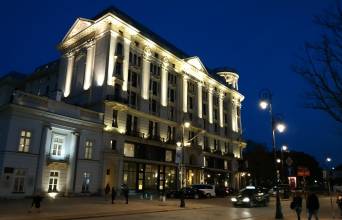Presidential Palace, Warsaw

Presidential Palace, Warsaw The Presidential Palace (Polish: Pałac Prezydencki) is the official residence of the Polish head of state and president alongside the Belweder Palace, located in Warsaw, Poland. Originally constructed in 1643 as an aristocratic mansion, it was rebuilt and remodelled several times over the course of its existence by notable architects.
The current neoclassical palace was completed in 1818. Throughout its history the palace was a venue for important historical events in Polish, European and world history. In 1791, the facility hosted authors and advocates of the Constitution of May 3, 1791, the first modern European constitution.
In 1818, the palace began its ongoing career as a governmental structure, when it became the seat of the Viceroy (namiestnik) of Congress Poland. Following Poland's resurrection after World War I, in 1918, the building was taken over by the newly reconstituted Polish authorities and became the seat of the Council of Ministers.
During World War II, it served the country's German occupiers as a Deutsches Haus and survived intact the 1944 Warsaw Uprising. After the war, it resumed its function as seat of the Polish Council of Ministers. On 14 May 1955, the Warsaw Pact was signed inside the Presidential Palace between the Soviet Union and the Eastern Bloc countries.
Since July 1994, the palace has been the official seat of the President of the Republic of Poland.
